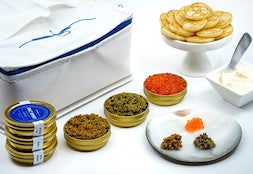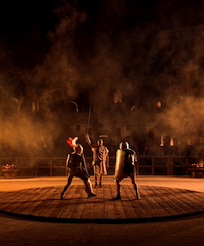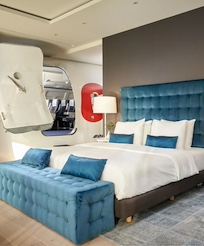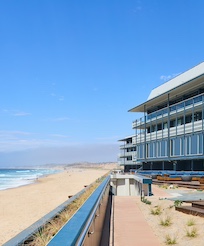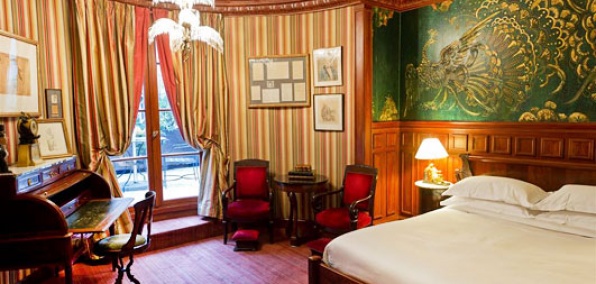
The Check-In: first-person romps through our favorite hotels.
L’Hotel is the smallest five-star hotel in Paris.
Its splendid restaurant is called Le Restaurant. Its minuscule bar, simply Le Bar.
With a lobby filled with gilded frames and velvet curtains, it feels of another era. The elevator is cantankerous and fits two uncomfortably. A handsome clerk perched at a handsome antique desk smiles at you tepidly when you check in, as if he suspects you’re there on some secret assignation, but he’s just too discreet to judge too harshly.
It is, in a sense, everything that the French do so very well. In a city filled with special hotels, this one stands out, and I was happy to sleep there this spring. In fact, if I had died there, that would have been okay, too. After all, Oscar Wilde quite famously expired there in 1900, back when it was called Hotel d’Alsace and was less a luxury destination and more of an SRO.
“My wallpaper and I are fighting a duel to the death,” he quipped. “One or the other of us has to go.”
Well, the wallpaper won the battle, but not the war. Acclaimed designer Jacques Garcia was the most recent one to rehab the hotel’s 20 bedrooms and attendant public spaces. He added baroque touches, more fabrics and plenty of grandeur. They also installed wi-fi. Oh, how Oscar would have loved wi-fi.
But he wasn’t the last celebrity to hang out here. Photos on the L’Hotel website tout a scrum of ’60s-era celebrities who have passed through—Salvador Dalí, Princess Grace, Frank Sinatra, Elizabeth Taylor, Richard Burton, Jim Morrison and Serge Gainsbourg. I just hoped they didn’t try using the elevator at the same time.
The aura of celebrity still lingers here, like a ghost, though it’s less louche and debauched than you’d imagine—Chateau Marmont this isn’t. It’s the sort of place where you’d come for tea with your business manager or summon Graydon Carter for that Vanity Fair piece they’ve been begging for.
My first night there, I wobbled in after a night of Left Bank champagning, and before heading up to my room I wanted to get a peek inside that Le Restaurant. I pushed aside a heavy drape and instantly spotted the specter of glacial-edged cheekbones sitting in the dining room. No, not a ghost. Why, it was Tilda Swinton.
I spent the next few days assiduously not gawping when we passed in the halls and lobby. She returned the favor, which I really appreciated. Gawping—so gauche, you know.
One morning, however, as I sat on the edge of the window, drinking coffee and looking at the small, narrow street below, a limousine pulled up directly underneath my window. Swinton stepped from the hotel onto the curb, and while a driver loaded her bags, she proceeded to the art gallery across the street, banged on the door and looked somewhat hopeless as she pressed her face up to it. She knocked. She banged some more. Nothing. With increasing frustration, she tried to shove something under a door—and then through the side of the door, but to no avail.
I decided to intervene.
“Hey, you!” I called. “Tilda!”
My Chicago nasal twang ricocheted all the way down the painted shutters of Rue des Beaux-Arts.
“Yes?” she asked, her English accent fluttering up as she scanned the windows searching for me.
“You want me to deliver that for you when the gallery opens?”
“What?”
“You want me to deliver that for you? Your envelope.”
“Oh! Would you? It’s for Arnaud!”
I didn’t know who Arnaud was, but small matter. If she trusted me, just some American hanging out of the window, I’d figure it out. Later, I realized that she might have just thought I was a hotel employee.
“I’ll be right down.”
“No. No. Stay where you are. I’ll leave it at the front desk. What’s your name?”
I told her, and after she had sped off, I went down to the front desk to ask probably the strangest question I’ve ever uttered. “Um. Did Tilda Swinton leave an envelope for me?”
The clerk, suspiciously, but discreetly, slid an envelope toward me. “Oui, monsieur.” It was as if he were handing over plans for the resistance to an unknown courier.
The gallery opened around 11am, and we found Arnaud. (It was his gallery, so it wasn’t difficult.)
“Our mutual friend Tilda Swinton wanted me to give you something,” I said.
Arnaud said nothing, but offered a tight, polite smile. He opened the envelope, read and shrugged indifferently in the way you always hoped a French art gallerist would. We chatted a bit and I learned Swinton had been in town for a special reading during a gallery opening.
When I returned to my room, I thought about Wilde and his lingering, fraught last days here when glamour was in short supply and so was money.
I wished he was here now. He would love it.
—Chris LaMorte
L’Hotel is the smallest five-star hotel in Paris.
Its splendid restaurant is called Le Restaurant. Its minuscule bar, simply Le Bar.
With a lobby filled with gilded frames and velvet curtains, it feels of another era. The elevator is cantankerous and fits two uncomfortably. A handsome clerk perched at a handsome antique desk smiles at you tepidly when you check in, as if he suspects you’re there on some secret assignation, but he’s just too discreet to judge too harshly.
It is, in a sense, everything that the French do so very well. In a city filled with special hotels, this one stands out, and I was happy to sleep there this spring. In fact, if I had died there, that would have been okay, too. After all, Oscar Wilde quite famously expired there in 1900, back when it was called Hotel d’Alsace and was less a luxury destination and more of an SRO.
“My wallpaper and I are fighting a duel to the death,” he quipped. “One or the other of us has to go.”
Well, the wallpaper won the battle, but not the war. Acclaimed designer Jacques Garcia was the most recent one to rehab the hotel’s 20 bedrooms and attendant public spaces. He added baroque touches, more fabrics and plenty of grandeur. They also installed wi-fi. Oh, how Oscar would have loved wi-fi.
But he wasn’t the last celebrity to hang out here. Photos on the L’Hotel website tout a scrum of ’60s-era celebrities who have passed through—Salvador Dalí, Princess Grace, Frank Sinatra, Elizabeth Taylor, Richard Burton, Jim Morrison and Serge Gainsbourg. I just hoped they didn’t try using the elevator at the same time.
The aura of celebrity still lingers here, like a ghost, though it’s less louche and debauched than you’d imagine—Chateau Marmont this isn’t. It’s the sort of place where you’d come for tea with your business manager or summon Graydon Carter for that Vanity Fair piece they’ve been begging for.
My first night there, I wobbled in after a night of Left Bank champagning, and before heading up to my room I wanted to get a peek inside that Le Restaurant. I pushed aside a heavy drape and instantly spotted the specter of glacial-edged cheekbones sitting in the dining room. No, not a ghost. Why, it was Tilda Swinton.
I spent the next few days assiduously not gawping when we passed in the halls and lobby. She returned the favor, which I really appreciated. Gawping—so gauche, you know.
One morning, however, as I sat on the edge of the window, drinking coffee and looking at the small, narrow street below, a limousine pulled up directly underneath my window. Swinton stepped from the hotel onto the curb, and while a driver loaded her bags, she proceeded to the art gallery across the street, banged on the door and looked somewhat hopeless as she pressed her face up to it. She knocked. She banged some more. Nothing. With increasing frustration, she tried to shove something under a door—and then through the side of the door, but to no avail.
I decided to intervene.
“Hey, you!” I called. “Tilda!”
My Chicago nasal twang ricocheted all the way down the painted shutters of Rue des Beaux-Arts.
“Yes?” she asked, her English accent fluttering up as she scanned the windows searching for me.
“You want me to deliver that for you when the gallery opens?”
“What?”
“You want me to deliver that for you? Your envelope.”
“Oh! Would you? It’s for Arnaud!”
I didn’t know who Arnaud was, but small matter. If she trusted me, just some American hanging out of the window, I’d figure it out. Later, I realized that she might have just thought I was a hotel employee.
“I’ll be right down.”
“No. No. Stay where you are. I’ll leave it at the front desk. What’s your name?”
I told her, and after she had sped off, I went down to the front desk to ask probably the strangest question I’ve ever uttered. “Um. Did Tilda Swinton leave an envelope for me?”
The clerk, suspiciously, but discreetly, slid an envelope toward me. “Oui, monsieur.” It was as if he were handing over plans for the resistance to an unknown courier.
The gallery opened around 11am, and we found Arnaud. (It was his gallery, so it wasn’t difficult.)
“Our mutual friend Tilda Swinton wanted me to give you something,” I said.
Arnaud said nothing, but offered a tight, polite smile. He opened the envelope, read and shrugged indifferently in the way you always hoped a French art gallerist would. We chatted a bit and I learned Swinton had been in town for a special reading during a gallery opening.
When I returned to my room, I thought about Wilde and his lingering, fraught last days here when glamour was in short supply and so was money.
I wished he was here now. He would love it.
—Chris LaMorte
